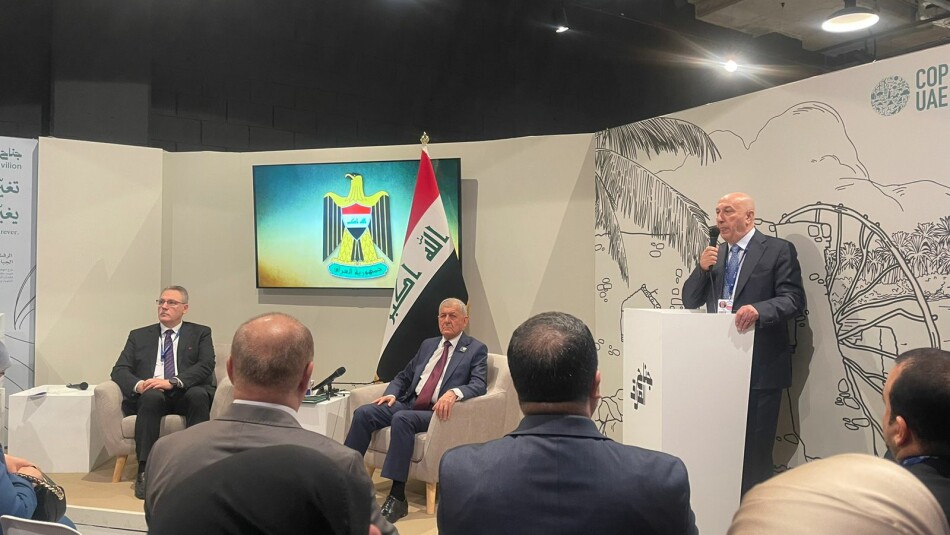
The Iraqi Environment Minister believes that Iraq is not the cause of climate change and has been harmed by it, so it has the right to be compensated under the Paris Agreement.
Nizar Amedi statements came in an interview with KirkukNow delegation to the 28th session of the United Nations’ UN Climate Change Conference of Parties in the UAE from November 30 to December 12, 2023.
Iraq became a member of the Paris Agreement in 2020. Our delegation in Dubai is currently participating in negotiations and discussions on several topics related to climate change and the Paris Agreement, the Iraqi Minister of Environment said.
“We want to say that Iraq is not the cause of the problems of climate change, but rather one of those affected by it, so it has the right of reparation according to the Paris Agreement,” he added.
For the first time, work is currently underway at the Climate Change Summit (COP28) to fix the amount of compensation that will be granted to member states of the Paris Agreement affected by climate change.
The budget of the “Loss and Damage” Fund for providing financial support to countries affected by climate change is estimated at $475 million.
According to United Nations reports, Iraq comes fifth in the classification of countries most affected by climate change.
“It is true that Iraq is the fifth most affected country by climate change... Every year the highest temperature is recorded in Iraq, and this year the highest temperature was recorded in Khanaqin district in Diyala Governorate,” Amedi said.
“It is clear that Iraq is greatly affected by climate change.”
"The Earth is part of the universe. The rise in the Earth's temperature has directly led to disruption of the entire ecosystem. The Earth is under the influence of human activities. We are the ones who have overtaken the components of the Earth, so the entire system has become disrupted."

One of the marshes in Iraq. The Iraqi Ministry of Environment
According to United Nations UN statistics and warnings, Iraq is ranked fifth among the countries most affected by the repercussions of climate change, the risks of water scarcity, drought, high temperatures, pollution, and other natural disasters.
More than 20,000 people have been forced to flee Iraq by the end of 2021 due to water shortages, according to the UN. Iraq annually burns 17 billion cubic meters of associated natural gas when drilling for oil, according to an energy expert.
"The situation in Iraq is bad from all environmental aspects, in terms of water and its pollution, in terms of desertification, where we lost large areas of agricultural land, as well as in terms of waste... All of this resulted from Iraq's failure to give importance to the environment."
Iraq has launched a bank to support environmentally friendly projects, the Green Bank of Iraq, at Iraq pavilion in COP 28 launched with three main branches with a capital of 400 billion Iraqi dinars IQD (USD300 Million). The bank's overall goal is to mitigate the impacts of climate change in Iraq, generating 100,000 job opportunities as the first phase.
He pointed out that successive wars, including the Gulf war, the war to overthrow Saddam Hussein’s regime in 2003, and the war against the Islamic State of Iraq and Syria ISIS, “all of these wars made Iraq regardless of climate change, but within a year of the current government’s life, this issue was given great attention and many achievements were achieved in this field.”
“Our presence at the Climate Change Summit, the allocation of a pavilion to Iraq, our participation with various delegations, the organization of many events, and the training of negotiating delegations are evidence that Iraq has entered the equation of interest in the issue of climate change.”
Regarding the Iraqi government’s strategy to work on the issue of confronting climate change, Amedi said, “All ministries participate in a strategy aimed at reducing pollution. The strategy began in 2023 and continues until 2030. The goal is to address the waste problem.”
"We have a group of investment projects to reduce waste and environmental pollutants, including renewable energy projects."
Amedi pointed out that Iraq needs to take further steps, including enacting new laws and providing facilities for projects and investments that fall within efforts to face climate change.
This story was produced as part of the 2023 Climate Change Media Partnership, a journalism fellowship organized by Internews' Earth Journalism Network and the Stanley Center for Peace and Security.